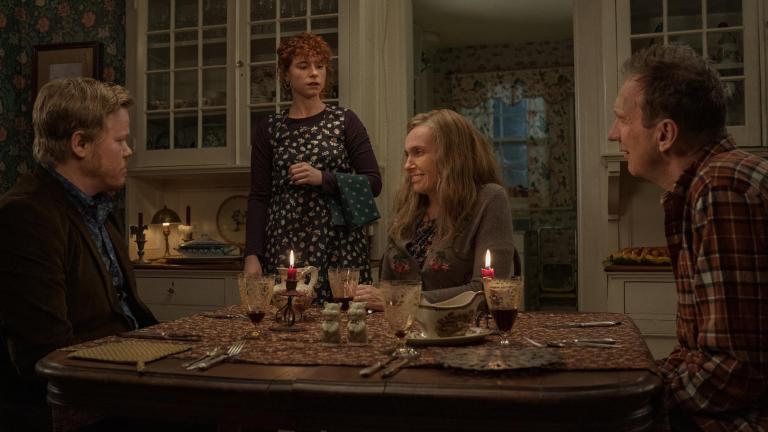I’m Thinking of Ending Things Review: Charlie Kaufman Does Existential Horror
Adapted from the popular novel, I’m Thinking of Ending Things is a complex chiller with a heart of darkness.

Based on the brilliant but deliberately mysterious novel by Iain Reid, adapted and directed by Charlie Kaufman who is known for his complex meta-textual scripts including Being John Malkovich, Eternal Sunshine of The Spotless Mind and Adaptation, Netflix’s I’m Thinking of Ending Things is a perfect storm of philosophy, ambiguity and wankery.
Not quite as dense as Kaufman’s Synecdoche, New York but definitely very much on the arthouse end of the spectrum for Netflix, a great sense of tension, unsettling visuals and terrific performances from its leads keep I’m Thinking Of Ending Things on the right side of weird. It’s opaque but it still manages to be incredibly compelling and rich. Especially if you watch it twice.
A thriller, or perhaps a horror of sorts, I’m Thinking Of Ending Things stars Jessie Buckley as a young woman travelling to a farmhouse to meet her boyfriend’s parents for the first time. In her opening narration she says she is thinking of ending things with her partner, Jake (Jesse Plemons), a slightly awkward intellectual and outsider who she’s been with for just six or seven weeks. At the house they meet Jake’s parents – Toni Collette and David Thewlis – who prepare a meal for them and invite them to stay the night, but Buckley’s character insists she needs to work in the morning so they must leave.
While it’s a fairly conventional sounding plot on paper, it’s clear something isn’t quite normal about this set up from the off as little inconsistencies start to wrong foot you. Is the narrator’s name Lucy or Louisa? Wasn’t she wearing a red hat and yellow scarf just a minute ago, but now they’re burgundy? Kaufman’s movie is a sinister exercise in disorientation, from the dog who appears on cue forever shaking his coat, to Jake’s parents, flitting back and forth in age and health.
Very talky and highly stylized, with cutaways which include musical numbers, dance sequences, an animated pig and moments from a fake romantic comedy movie, it’s a smart way of translating a psychological thriller told largely first person to the screen. The couple discuss philosophy, literature, and art, Buckley’s character recites poetry and at one point morphs into Pauline Kael performing a review of Cassavetes’ Woman Under The Influence while Jake channels David Foster Wallace and uses words like ‘ipseity’ (individual identity) and ‘cruciverbalist’(someone who likes crosswords) – it’s not quite as annoying as that sounds but it is willfully hard work, particularly for those who haven’t read the book.
Buckley is terrific in what is surely an incredibly challenging role – she’s our window into Jake’s messed up world as well as a complex character who changes on a dime and Buckley proves once again what an exciting performer she is keeping the audience on side throughout. Colette is larger than life as Jake’s mother – ditzy, hysterical, overbearing, but also frail and weak, while Thewlis, too is a rich caricature of a particular generation of fatherhood. There’s awkward humor here too – a dinner table argument about the “Genius” edition of Trivial Pursuit (it’s “Genus”) is funny and excruciating in equal measure.
Mostly though, this is a film steeped in sadness and Kaufman drenches his frames in grief from the opening shots, dropping clues throughout as to what is really going on here. Molly Hughes and Merissa Lombardo’s meticulous production design, particularly with the farm house, is so evocative of aging that you can almost smell it as you’re watching, while the ice cream shop in the middle of nowhere has a tangible ethereal quality – is this purgatory? Or is it hell?
This is unreliable narration to the extreme – it looks like a relationship drama, told as a horror movie but eventually turns out to be something else entirely, unravelled via interpretive dance. Which is also not as annoying as that sounds.
Like the book, which very much encourages the reader to consume it twice, the film also feels very different on a second go round, with much to say about gender, aging, and loneliness. That does however mean that the first watch doesn’t quite carry the same emotional impact – it’s very clever but not terribly moving or entirely satisfying. Like Plemons’ Jake, it’s a bit too tied to its intellectual and existential goals to properly relate on a visceral, emotional level. Not for everyone, and not an easy ride, I’m Thinking Of Ending Things is nonetheless a bold take on a difficult book with a highly distinctive style.
